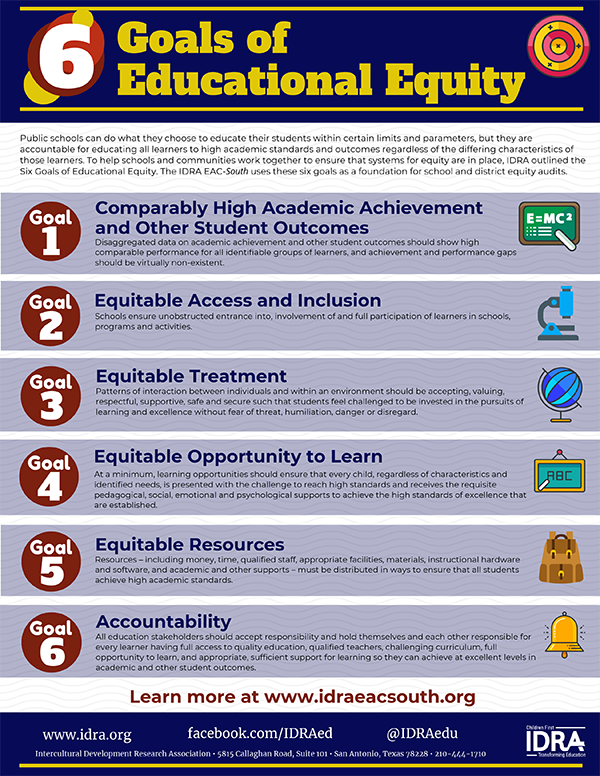 Public schools can do what they choose to educate their students within certain limits and parameters, but they are accountable for educating all learners to high academic standards and outcomes regardless of the differing characteristics of those learners.
Public schools can do what they choose to educate their students within certain limits and parameters, but they are accountable for educating all learners to high academic standards and outcomes regardless of the differing characteristics of those learners.
To help schools and communities work together to ensure that systems for equity are in place, IDRA outlined Six Goals of Educational Equity. The IDRA EAC-South uses these six goals as a foundation for school and district equity audits. School personnel and communities can use as a yardstick to measure their progress and as a lightning rod to galvanize change.
See the 6 Goals of Educational Equity infographic page.
Six Goals of Educational Equity
Goal 1: Comparably high academic achievement and other student outcomes
As data on academic achievement and other student outcomes are disaggregated and analyzed, one sees high comparable performance for all identifiable groups of learners, and achievement and performance gaps are virtually non-existent.
Goal 2: Equitable access and inclusion
Schools ensure unobstructed entrance into, involvement of and full participation of learners in schools, programs and activities.
Goal 3: Equitable treatment
Patterns of interaction between individuals and within an environment should be accepting, valuing, respectful, supportive, safe and secure such that students feel challenged to be invested in the pursuits of learning and excellence without fear of threat, humiliation, danger or disregard.
Goal 4: Equitable opportunity to learn
At a minimum, learning opportunities should ensure that every child, regardless of characteristics and identified needs, is presented with the challenge to reach high standards and receives the requisite pedagogical, social, emotional and psychological supports to achieve the high standards of excellence that are established.
Goal 5: Equitable resources
Resources – including money, time, qualified staff, appropriate facilities, materials, instructional hardware and software, and academic and other supports – must be distributed in ways to ensure that all students achieve high academic standards.
Goal 6: Accountability
All education stakeholders should accept responsibility and hold themselves and each other responsible for every learner having full access to quality education, qualified teachers, challenging curriculum, full opportunity to learn, and appropriate, sufficient support for learning so they can achieve at excellent levels in academic and other student outcomes.
Tools and Resources
Flier with the six goals in English and Spanish.
IDRA’s tool: Six Goals of Educational Equity and School Reform – The Equity Ranking Scale
Questions for Reflection, Discussion and Action
IDRA Quality Schools Action Framework
Six Goals of Educational Equity – Podcast Episode 29
Article: “Who’s Responsible, Who’s to Blame?,” by Bradley Scott, Ph.D., IDRA Newsletter, May 2002
Article: “Coming of Age,” by Bradley Scott, Ph.D., IDRA Newsletter, March 2001
More Articles
“The Challenge of Seeing, Part II – Shaping the Sixth Generation of Civil Rights and Educational Equity,” by Bradley Scott, Ph.D., IDRA Newsletter, November-December 2013
“Assuring Civil Rights Protection with State ESEA Flexibility Waivers”, by Bradley Scott, Ph.D., IDRA Newsletter, May 2013
“Building a Civil Rights Juggernaut Using the Common Core Standards,” by Bradley Scott, Ph.D. IDRA Newsletter, February 2013
“The Challenge of Seeing – Shaping the Sixth Generation of Civil Rights and Educational Equity,” by Bradley Scott, Ph.D., IDRA Newsletter, September 2012
“A Guide for School Board Members to Assess District Effectiveness,” by Abelardo Villarreal, Ph.D., & Rosana G. Rodríguez, Ph.D., IDRA Newsletter, June-July 2010
“Tyranny of Old Ideas About School Board Responsibilities,” by Abelardo Villarreal, Ph.D., and Rosana G. Rodríguez, Ph.D., June-July 2010
“The Role of School Governance Efficacy in Building an Equity Context for School Reform,” by Bradley Scott, Ph.D., IDRA Newsletter, June-July 2009
“Equalizing Funding of Texas School Facilities – A Long-Standing, Long-Neglected Need,” by Albert Cortez, Ph.D., IDRA Newsletter, February 2007
“Expanding Children’s Access to Science,” by Bradley Scott, Ph.D., IDRA Newsletter, April 2003
“We Should Not Kid Ourselves: Excellence Requires Equity,” by Bradley Scott, M.A., IDRA Newsletter, February 2000
“Equity Principles and School Reform: What it Takes to Ensure that ‘All Means All,’” by Adela Solís, Ph.D., IDRA Newsletter, February 2000
“From ‘DAC’ to ‘EAC’ – The Expanding Role of the Equity Assistance Center,” by Bradley Scott, M.A., IDRA Newsletter, February 1999

